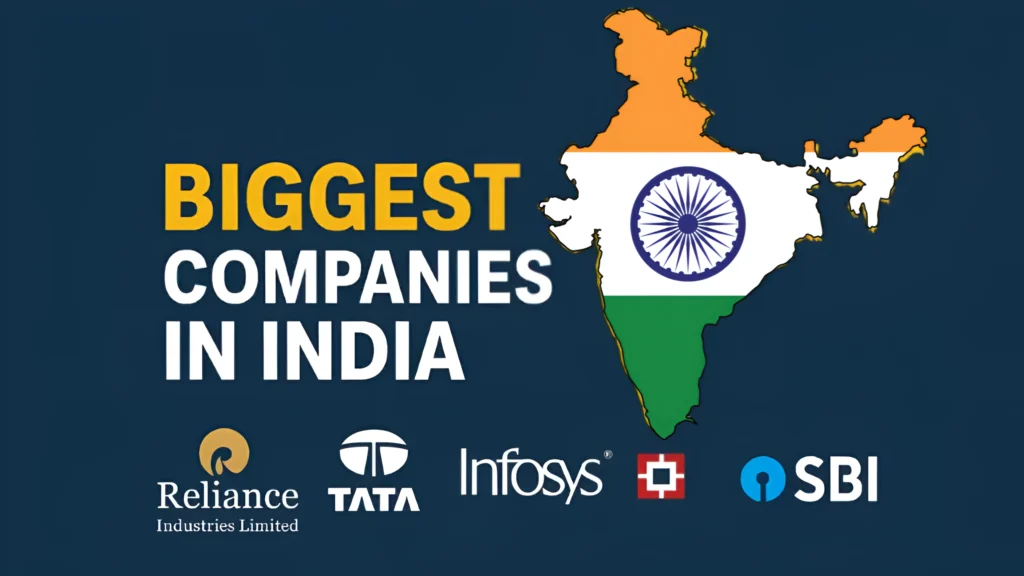India is now one of the world’s fastest-growing major economies, and the same is true in its corporate sector. India’s biggest companies are not merely national champions but global industry builders creating jobs for millions, changing industries, and influencing India’s GDP significantly. As India plans to become the world’s third-largest economy by 2030, knowing what the biggest companies are in India gives us important insights into the country’s economic future.
This in-depth guide discusses the 15 biggest companies in India by market cap, revenue, and industry impact. These market cap leaders among Indian companies are from various sectors such as technology, finance, energy, telecom, and consumer goods. Since Reliance Industries dominates various industries, TCS is a global leader in IT; these two corporations are the drivers of the economic ambitions of India.
Whether you’re an investor seeking to understand India’s most valuable and biggest companies, a business professional analyzing top Indian corporations, or simply curious about which is the biggest company in India, this article provides detailed profiles of each company, their market position, and future outlook.
Top 15 Biggest Companies in India in Detail.
1. Reliance Industries Limited (RIL)
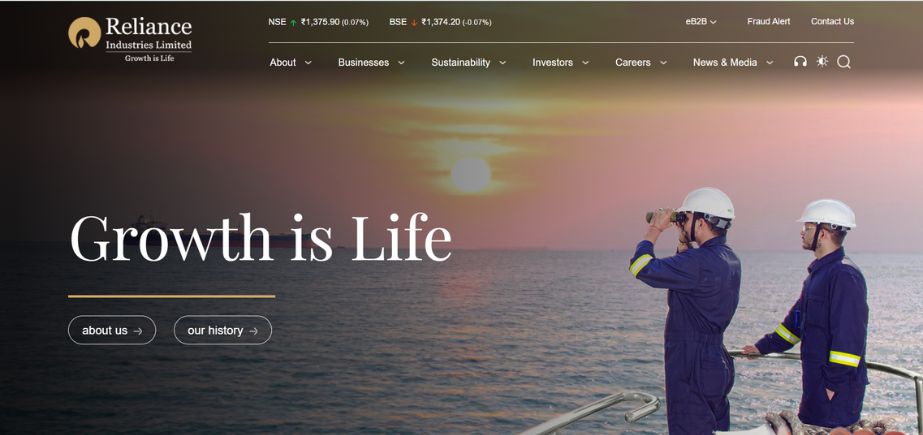
When asking which is the biggest company in India, the answer is unequivocally Reliance Industries. Established in 1973 by the legendary businessman Dhirubhai Ambani, Reliance has built itself as a textile producer into the most valuable company in India with a market capitalisation of ₹18.76 trillion (appraised as about 225 billion dollars).
The empire of Reliance is diversified in several industries: petrochemicals and refining, telecommunications, with Reliance Jio, retail business in India, and, to a growing extent, renewable energy. Jamnagar refinery complex by the company is the largest refining complex in the world. Through the leadership of Mukesh Ambani, Reliance has shaken the Indian telecom sector with the cheap data plans of Jio, which have fundamentally changed the way Indians experience the internet.
Reliance is actively investing in green power and expects to be net-zero by 2035. The company is also building solar manufacturing, battery storage, and green hydrogen manufacturing. This is a strategic shift that puts Reliance at the centre of the Indian energy transformation but still retains its conventional energy leadership.
2. Tata Consultancy Services (TCS)

TCS represents India’s prowess in the global technology sector and stands as one of the biggest companies in India. TCS is the second most valued company in India, with a market capitalization of 16.60 trillion, and the jewel of the Tata Group.
The company operates in over 50 countries and has customers in the health care, manufacturing, retail, insurance, and banking sectors. TCS employs over 600,000 people and has an annual income exceeding 29 billion, and is among the largest IT service exporters in the world. TCS’s capabilities and competencies in its digital transformation, cloud computing, artificial intelligence, and cybersecurity have been invaluable to the global Fortune 500 businesses.
Among the key areas TCS is making investments in 2025 are generative AI solutions, quantum computing research, and sustainability consulting. Its focus on innovation and effective delivery network, as well as its relationship with clients, guarantees its presence among the leading revenue and profit generating biggest companies in India.
Don’t Miss: Tata 1mg Franchise
3. HDFC Bank

HDFC Bank is India’s largest private sector bank and one of the biggest companies in India by both market capitalization (₹11.14 trillion) and asset quality. HDFC Bank was established in 1994 and has transformed Indian banking by adopting technology, excellent customer service, and taking the right precautionary steps in managing risk.
With a large network of branches and ATM machines spread all over India, the bank has more than 75 million customers. The strengths of HDFC Bank are retail banking, credit cards, personal loans, and digital banking platforms. Its internet and mobile banking are always ranked as one of the best in India.
HDFC Bank is currently targeting rural penetration, small business lending, and expanding its digital capability in 2025. The bank has been even more powerful in home loans and mortgage financing after it was merged with HDFC Limited, making it one of the most valuable and biggest companies in India.
4. ICICI Bank
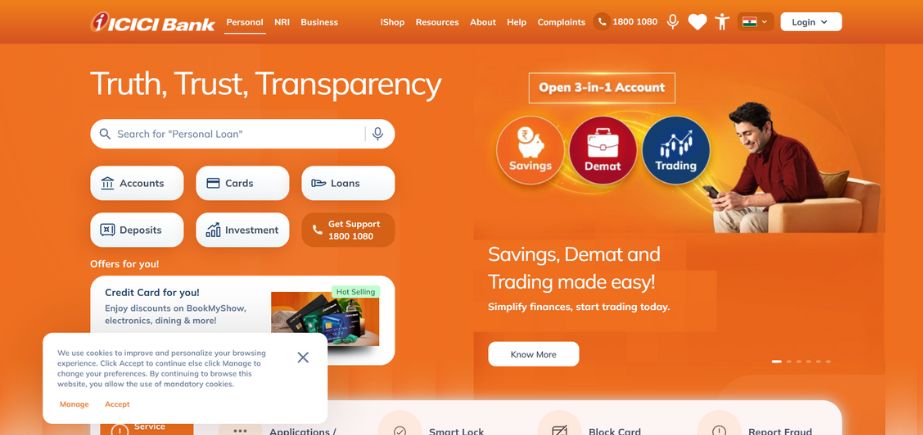
The second-largest Indian technology-oriented and privately held bank, with a market capitalization of ₹11.00 trillion, is the ICICI Bank. The bank has been a leader in the field of digital banking innovations, releasing such innovations as instant accounts, AI-based chatbots, and blockchain-based services.
ICICI Bank has millions of retail, SME, and corporate clients in India and beyond. It has a wide range of products, such as retail banking, corporate banking, investment banking, life insurance, and asset management. The bank has a good balance sheet, minimal non-performing assets, and good profitability, which is why investors love it.
ICICI Bank will be increasing rural market reach, making its SME lending business more vertical, and focusing on cybersecurity and data analytics in 2025. The bank has been keen on sustainable finance and ESG activities, and this factor also puts the institution in a good position to grow in the future.
Suggested Blog: Private Bank List in India
5. Infosys
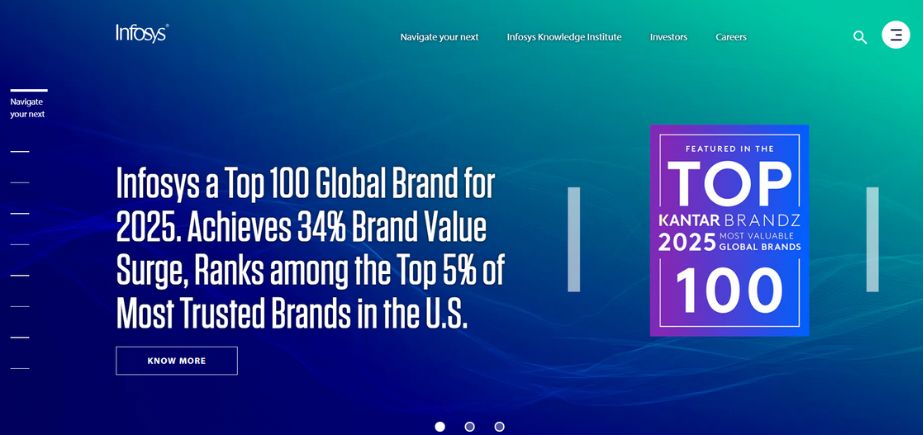
Infosys, which is worth ₹10.23 trillion, is yet another flagship among India’s best IT firms. Infosys was founded by N.R Narayana Murthy and six engineers in 1981 with a launch capital of $250, and it is now a technology giant operating in 56 countries across the globe.
It is a technology services, digital transformation solutions, and consulting specialist. Infosys has customers in the financial services, manufacturing, retail, energy, and healthcare industries. It owns Finacle banking software, which is implemented by banks globally, and the Consulting service helps firms negotiate complex online transformations.
Infosys is focusing on generative AI, cloud-native, and cybersecurity in 2025. The Topaz AI platform is a system that adapts AI features in all the services that the company offers, allowing clients to utilize artificial intelligence to expand their business. The global clients also find the sustainability and carbon-neutral operations by 2030, committed by Infosys, very attractive.
Also read: Top Software Companies in India
6. Hindustan Unilever (HUL)
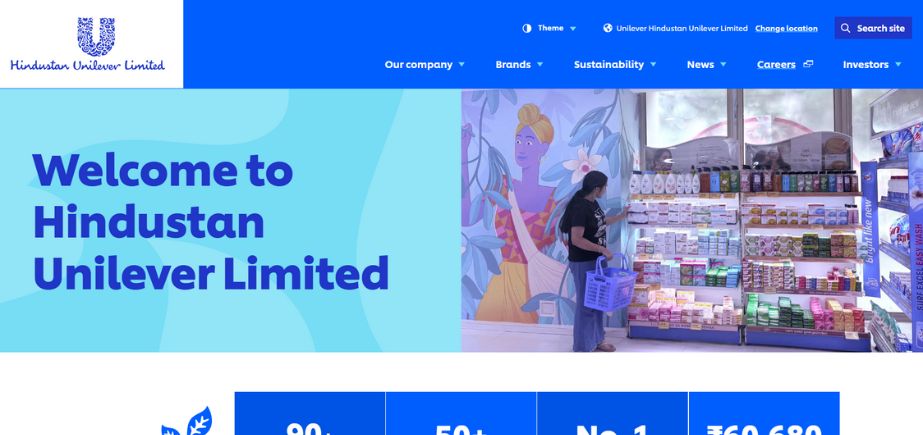
Hindustan Unilever is one of the biggest companies in India, with a market capitalization of ₹7.60 trillion. HUL is a subsidiary of Unilever, which has 46 factories in India and markets over 35 brands in the home care, personal care, food, and beverage categories.
Household brands in India include Surf Excel, Rin, Wheel, Lifebuoy, Lux, Dove, Clinic Plus, Sunsilk, Fair and Lovely (since renamed to Glow and Lovely), Ponds, Vaseline, Lakme, Brooke Bond, Bru, Knorr, Kissan, and Kwality Wall. HUL reaches over 300 million Indian consumers in a single day, and its distribution channels reach the bottom of the village.
In 2025, HUL is engaged in premiumization, e-commerce growth, and sustainable products. The company is reducing its use of plastic packaging, purchasing sustainable raw materials, and launching products that will suit the evolving needs of Indian consumers. HUL’s strong distribution network and brand equity ensure its continued dominance among top business groups in India.
7. ITC Limited

ITC Limited, valued at ₹5.92 trillion, is among the top conglomerates in India with businesses spanning FMCG, hotels, paperboards, packaging, and agribusiness. ITC has been in a position to explore and penetrate different industries, but initially, the company was dealing with cigarettes.
ITC FMCG includes Ashirvaad, Sunfeast, Bingo, Yippee, Classmate, Vivel, and Fiama. The company operates luxury hotels, which it manages under the brand ITC Hotels, and is a big player in the paperboard and packaging industry. ITC e-Choupal is a program that connects millions of farmers with the market; it is committed to rural development.
In 2025, ITC is accelerating its growth in its FMCG range, particularly in the areas of food, personal insurance, and education products. The criterion in terms of corporate environmental responsibility is sustainability, which the company is carbon-positive, water-positive, and solid waste recycling-positive.
Also Read: Franchise Management Software
8. State Bank of India (SBI)

The State Bank of India, with a market capitalization of ₹5.91 trillion, is India’s largest public sector bank and one of the top banks in India by assets, deposits, and branch network. SBI has a history of being involved in Indian banking; its beginnings trace back to 1806.
Through its global operations, SBI has an excess of 22 thousand branches in India and has millions of customers across the globe. The bank regulates rural banking, agricultural credit, and government banking services. SBI coverage is large, and this makes the bank critical to financial inclusion in India.
SBI aims to modernise its technology infrastructure and grow in digital banking, retail, and SME lending in 2025. Bank has created a mobile application named YONO (You Only Need One), which has been popular amongst the Indian market as a banking application and offers both financial and lifestyle solutions.
9. Bharti Airtel
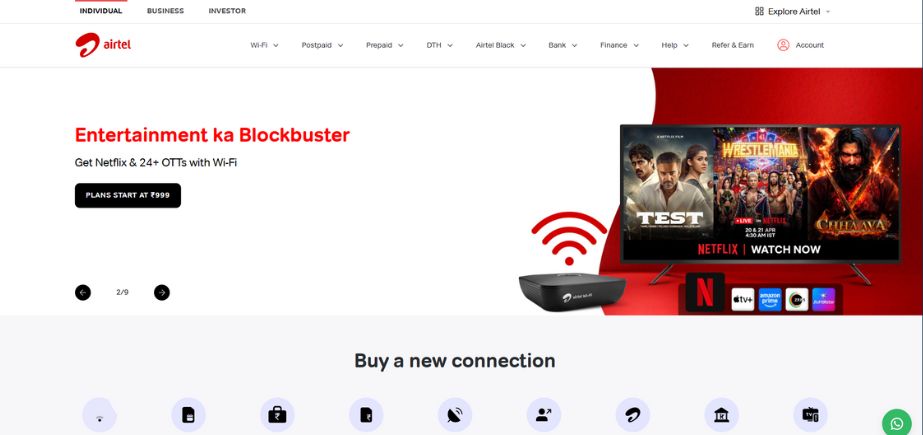
The second-largest participant in the ongoing telecommunications revolution is Bharti Airtel, a giant corporation in India worth 5.73 trillion. Airtel is a mobile, broadband, and enterprise service provider with headquarters in 18 countries in Asia and Africa and has hundreds of millions of users.
Airtel has been enjoying profitability within the competitive Indian telecom sector, but has been pouring funds into 5G infrastructure. The launch of the 5G network in the key Indian cities in 2022-2023 already drove the company to become the leader in technological development.
Airtel has also extended the sources of its income with Airtel Payments Bank, Wynk Music, and Airtel Xstream. Airtel is working on 5G penetration, enterprise solutions, and the growth of digital services in 2025. Its investments in fiber broadband and data centers are positioning the company in the right place in the new Indian internet economy.
10. Adani Enterprises
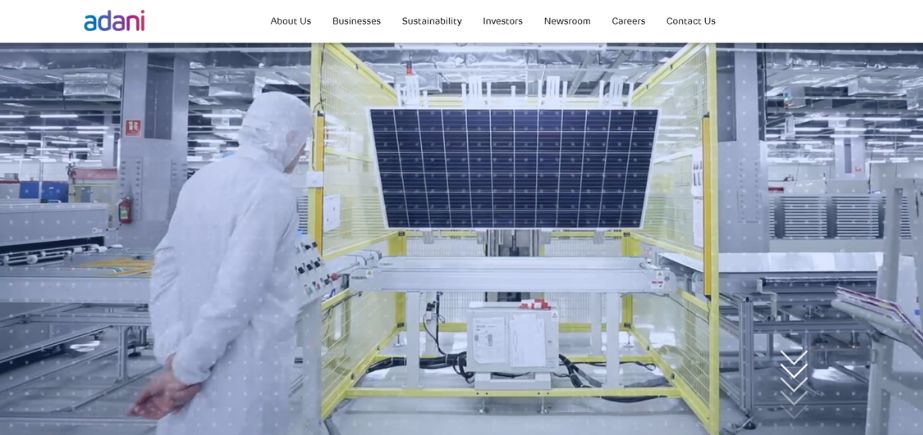
Adani Enterprises, the main company in the Adani Group, one of the fastest-growing Indian corporations, has a market capitalization of 5.45 trillion. Its functionality is defined by a wide range of interests, such as infrastructure development, resource management, energy, and logistics.
The Adani Group has a big port, airports (Mumbai, Ahmedabad and Lucknow), power generation and distribution, renewable energy and mining coal businesses. This group has expansive growth plans that have made it a participant in creating infrastructure in India.
Adani Enterprises is investing heavily in solar and wind power generation and renewable energy in 2025. The company is undertaking a strategic transition to sustainable energy solutions, which can be observed through its green hydrogen strategic plans and the fact that the company is targeting to become carbon-neutral by 2050.
11. Life Insurance Corporation of India (LIC)

India boasts the most valuable life insurance firm, LIC, which is valued at ₹5.22 trillion, a financial institution, and a leading institutional investor. Since its inception in 1956, LIC has significantly contributed to the mobilization of household savings and their further investment in long-term investments.
With hundreds of millions of policyholders, LIC dominates over 60 percent of the market share in the Indian life insurance business. The company has an extensive network of agents who reach remote rural areas as well, and life insurance is now accessible to all in India. One of the reasons LIC is such a force in the Indian equity markets is its huge asset base.
In 2025, LIC will refresh its product line and increase online capabilities and customer care. A new line of insurance products tailored to millennials and Gen Z is also underway, as well as its protection and savings product strengths.
12. Bajaj Finance

Bajaj Finance, a pioneer in digital lending and (non-banking) financial company (NBFC), is the biggest with a market capitalization of ₹5.05 trillion. The company provides a variety of financial products such as consumer financing, SME financing, rural financing, and deposit financing.
The technology-based business model of Bajaj Finance has facilitated fast loan processing, smooth online deals, and effective business. Consumer finance in India has been revolutionized by the EMI card the company offers, consumer loans across various products such as consumer durable loans, and digital lending platforms. Its high quality of assets and stable profitability has earned it preference in the market.
In 2025, Bajaj Finance is broadening its scope to newer areas such as affordable housing finance, wealth management and insurance distribution. Investment into the AI-based credit check and fraud detection enhances the competitive advantage of the company in the new financial services sector in India.
13. Larsen and Toubro (L&T)

L&T is the biggest construction and engineering company and the largest diversified conglomerate in India with a valuation of 4 trillion rupees. It is involved with mega infrastructure such as metros, highways, buildings, power plants, and industrial facilities in India and abroad.
L&T is involved in more than just construction; it is also involved in manufacturing (heavy engineering, defense systems, electrical equipment), L&T Infotech IT services and financial services. With its technological fortitude, brilliant project implementation, and creativity, the corporation is an invaluable component of the infrastructure building of India.
The current targets of L&T are now directed to smart cities 2025, green energy infrastructure, hydrocarbon projects, and military production. The company is leading the global energy transition by investing in green technology such as hydrogen power and capturing carbon.
14. Sun Pharmaceutical Industries
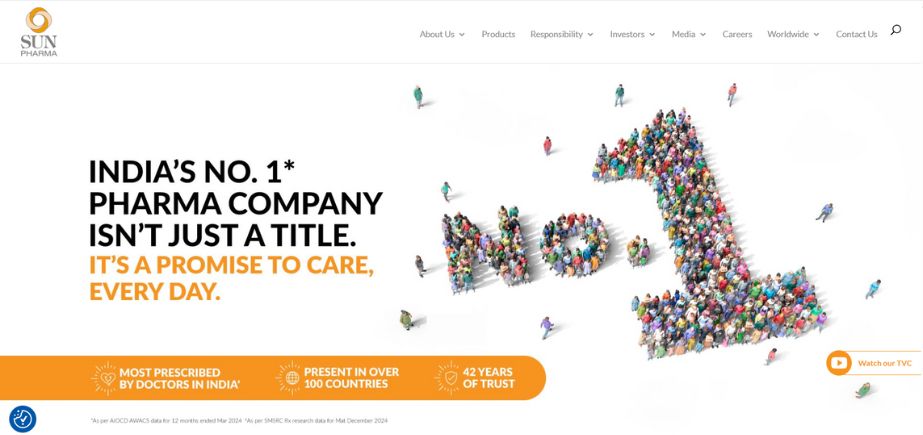
Sun Pharma is the biggest Indian pharmaceutical by market capitalization and a vast producer of generic pharmaceuticals across the entire globe with a market capitalization of 3.96 trillion. Its production facilities are found throughout the world and its product is marketed in over 100 countries.
The specialty medicine business, especially in the dermatology and ophthalmology field, supplements the strong generics portfolio of Sun Pharma. The sale of Ranbaxy and Taro Pharmaceuticals by the company has added a lot of global presence to the company. Strong R&D capabilities at Sun Pharma lead to the development of new products and clearance of new products.
Sun Pharma is investing in complex generics, biosimilars and specialty medicines in 2025. The company is committed to emerging markets and new therapies which guarantees further expansion in a more competitive worldwide pharmaceutical industry.
15. Wipro
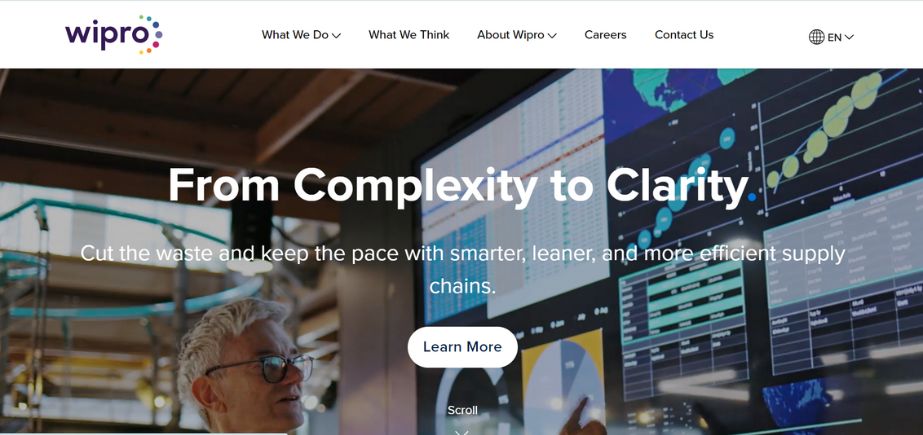
Wipro, valued at ₹3.93 trillion, rounds out our list of the 15 biggest companies in India. Wipro, one of the earliest Indian IT firms, started as a manufacturer of vegetable oils before transforming to a technology services firm in 66 countries worldwide.
Wipro delivers IT, consulting and business process services in the banking, healthcare, energy, retail and manufacturing industries. The acquisition of Capco and other companies by the company has enhanced its consulting skills and expertise in the sector.
Wipro is targeting AI, cloud services, cybersecurity and sustainability consulting in 2025. The alliances that the company has with the world-leading technology solutions providers such as Microsoft, AWS, and Google Cloud have allowed it to provide the most innovative solutions to clients worldwide.
Sectoral Visions: The Economic Composition of India.
The 15 biggest companies in India tell us some crucial facts about the Indian economic setup:
Technology Dominance: 3 IT giants ( TCS, Infosys and Wipro) in top 15 highlight the global technological leadership in India. These businesses export billions worth of services every year and hire millions of people.
Financial services strength: There is evidence of the maturity and the depth of the financial sector in India with the presence of four banking and financial institutions (HDFC Bank, ICICI Bank, SBI, Bajaj Finance) and the LIC.
Conglomerate Power: Diversified and biggest companies such as Reliance, ITC, Adani, and L&T show the prowess of large business houses which have their operations spread across various industries.
FMCG Presence: The addition of HUL indicates the role of consumer goods in the Indian economy and the large market potential in the country.
Telecommunicating Development: The presence of Bharti Airtel signifies the importance of connectivity in the digital transformation of India.
Such sectoral trends suggest that India is shifting to knowledge-based services, digital technologies, and consumer-led growth, abandoning traditional manufacturing.
Prospectus: The Indian corporate growth of the next decade
The top-performing Indian companies in 2025 are well-positioned for the future, but they also face significant challenges and opportunities:
Digital Transformation: All large organizations are making hefty investments in AI, cloud computing, and other digital solutions to stay competitive.
Green Transition: Reliance, Adani, and L&T, along with other biggest companies, are shifting to renewable energy and sustainable practices through regulation and market demand.
Internationalization: Indian firms are expanding their activities outside the country, buying foreign firms and setting up international operations.
Innovation Focus: The level of R&D investments is increasing not only in the pharmaceutical industry preparing new medications but also in IT sectors that create AI systems.
Demographic Dividend: The young, expanding population of India is a huge domestic market with great potential especially in the consumption market, financial, and technology.
As India targets becoming a $10 trillion economy by 2030, these Indian stock market leaders will play crucial roles in job creation, innovation, and economic growth. New conglomerates will be born as emerging industries, such as electric vehicles, semiconductors, green hydrogen, and advanced manufacturing, grow, and established leaders enhance their presence.
Also Read: Platforms to Write Reviews
Conclusion
The 15 biggest Indian firms represent the nation’s diversity of economy, entrepreneurial DNA, and global ambition. And from Reliance Energy, telecom, and retail dominance to TCS global IT dominance, they are not just biggest companies, but national treasures, driving innovation, employment, and wealth.
Knowing who is the largest company in India and the competition among these giants is rich data to any investor, entrepreneur and anyone willing to understand the economic direction of India. They are the most profitable Indian brands that have survived the economic waves, regulatory environment and competition to emerge as the market leaders.
With India on the path of becoming the 3rd largest economy in the world, these front-runner Indian companies will be in the first line, evolving with new technologies, entering new areas of growth and becoming successful competitors on the global arena. India is setting itself up to decades of technological, financial, energy and consumer growth and prosperity.
The diversity of potential paths to becoming a success in the world-most dynamic leading economy and the nature of this list (IT services, banking, conglomerates, FMCG, telecom and infrastructure) signals the compatibility between Indian economic growth and the variety of possible solutions.

